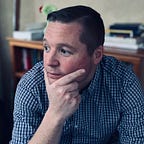Accepting Uncertainty: The Most Important Question A Chronic Illness Patient Can Ask
The following post is part of the The January Project: Chronic Illness. A month long project where I research and write about chronic illness. The information presented in this project is intended for educational purposes only.
I am not a doctor. I am a teacher and writer who, while being afflicted with two chronic illnesses, is trying to learn how to live a productive and peaceful life.
With this project I hope to increase awareness, offer comfort to those living with chronic illness and offer clarification to anyone who knows a person living with chronic illness.
Why am I sick?
What did I do to deserve this fate?
Like a car accident, a chronic illness often slams you without warning.
One moment you’re cruising along, windows down, radio up and the next– you and your car are cartwheeling out-of-control through an intersection.
My symptoms happened overnight.
Literally.
One day I was coaching and playing soccer and the next day my vision was blurry, my head was spinning and my legs were so weak I could barely climb a flight of stairs.
That was August of 2013.
According to the National Council of Health nearly 50% of Americans have at least 1 chronic illness.
Approximately, 161 million people are currently struggling fears and frustrations of having a chronic illness.
On September 5, 2013 an MRI of my brain revealed that I had cerebellar atrophy–a deterioration of nerve cells in the cerebellum.
In April of 2015 a biopsy of my thigh muscle revealed I had sarcoidosis– a chronic illness that causes muscular and organ inflammation.
And even with those confirmations I was still so confused, so frustrated, so angry.
Why did I get sick?
What could I have done differently to avoid this fate?
If there was a God, why was he doing this to me?
A chronic illness unnerves you.
For years I endured moral freezes. I couldn’t think, decide. I couldn’t, as my old soccer coach would bark, “get my shit together.”
Like a high stakes game of hide-and-go-seek, success in life is often predicated on our curiosity, our desire to seek until we find what we are looking for.
But what happens when you’re sick and short on energy? What happens after years of blood tests, biopsies, scans and observations experts still shrug and admit they don’t know?
What happens when you simply can’t find what you’re looking for?
Five years ago I did not realize that uncertainty is an opportunity for growth and change.
I was obsessed with questions like:
Why am I sick? What did I do to deserve this fate?
But those question lead me nowhere. Those questions only increased my confusion, frustration and anger.
Five years later I still have those questions but I’m in a much better place.
Why?
Because I edited down all of my questions into the most important question I’ve ever asked:
I’m sick…
..Now what am I going to do about it?
This question forced me to do two things:
- Accept the situation.
- Assume responsibility and take action.
It’s only natural when you’re suffering with a chronic illness to ask the unfocused, unanswerable questions. I did for years. But those questions are like a hamster wheel. They’re exhausting and repetitive and get you nowhere.
A question like, “why is this happening to me?” gives your illness power and permission to seize control your life.
You can not allow a chronic illness to impose its will on you.
You must go on the offensive, take action and attack for as long as you can.
Because taking action builds strength, confidence and independence.
Three feelings that I had almost forgotten about.
Here’s how I attack chronic inflammation:
- A plant-based diet (This was huge. Since converting to a plant-based diet, I no longer take ANY prescription drugs. You can read the full story of my conversion in “How I Finally Kicked Prednisone’s Ass)
- Light exercise (walking or riding a stationary bike and some Pilates exercise I learned from personal trainer and chronic illness advocate Megan Densmore for about 20 minutes 3 times a week. Exercise is one area where I need to be more consistent. I would like to increase my sessions to 30 minutes, 4 times a week)
- Drink 12 oz of an Orgain Creamy Chocolate Fudge everyday. Orgain is an organic plant based protein shake a which contains 21 grams of protein per 12 oz. I mix it with almond milk.
- Take a morning and afternoon vitamin packet. The Peak Performance Total Health packets are produced by the Melaleuca company and consist of 12 essential vitamins.
Here’s how I attack my cerebellar atrophy:
- I take one 500 mg dose of the amino acid Acetyl L-Carnitine. Studies have shown Acetyl L-Carnitine has proven to increase brain activity, effective in treating various mental disorders including Alzheimer’s, improve balance and stability among ataxia patients. ( Ataxia is a lack of muscular coordination.)
- Take a morning and night Vertisil capsule. Vertisil is an all-natural supplement that relieves dizziness, nausea and head spinning.
- Read and write everyday (Since I have brain damage, I want to keep my brain stimulated and strong. Furthermore, I believe that my daily practices of reading and writing are important to my physical improvements. As the old saying goes, “healthy mind, healthy body.”
- Balance exercises ( Again some Pilates exercises I learned from Megan Densmore).
The uncertainties of my illnesses inspired me to make greater investments into my health.
And five years later I’m finally off the hamster wheel.
I’ve made myself responsible.
Because when you’re grappling with a chronic illness you must push back, you must reclaim your health.
Because it’s your health and only you can do something about it.
Be well,
Jay
